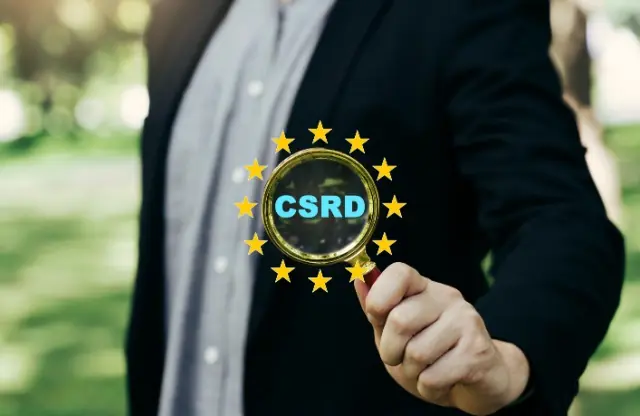Understanding the Corporate Sustainability Due Diligence Directive
 Share
Share
 Copy Url
Copy Url

The Corporate Sustainability Due Diligence Directive (CSDDD) is one of the European Union's newest efforts to promote a greener, more responsible future. This directive gives companies clear rules on how to handle their due diligence obligations. It pushes them to think about how their actions affect the environment and human rights. Whether you're familiar with sustainability reporting or just learning about CSDDD, there’s a lot to understand. Companies in the EU must follow this directive to make sure their actions meet sustainability goals. This article will cover everything from the directive’s background to how it will be enforced.
We’ll also explain the CSDDD’s requirements, which companies the rules apply to, and what benefits and obligations are involved. Additionally, we’ll look at how the new rules connect with other sustainability laws and how the timeline for these changes will work. Finally, we’ll discuss the next steps businesses need to take. Let’s dive in and explore what the Corporate Sustainability Due Diligence Directive means for companies today.

What is the Corporate Sustainability Due Diligence Directive?
The Corporate Sustainability Due Diligence Directive (CSDDD) is a new rule from the European Union (EU). It makes large companies responsible for human rights and the environmental impacts of their actions. The goal is to push companies, both in the EU and non-EU, to act more sustainably. Companies must find, stop, and fix any harm they cause through their chain of activities, which includes their subsidiaries and business partners.
The CSDDD supports the EU's move toward a circular economy. It urges companies to focus on more than just profits. They must also think about their business and human rights duties. Companies that operate globally have due diligence obligations under this directive. This means they must watch for and reduce risks like environmental damage or human rights violations. It also promotes transparency by requiring regular sustainability reporting.
Overall, the CSDDD helps create fair rules for all businesses and encourages them to adopt responsible practices that protect people and the planet.
Background
The Corporate Sustainability Due Diligence Directive (CSDDD) was created by the European Commission on February 23, 2022, to encourage companies to act responsibly. It was approved by the Council of the European Union on May 24, 2024. The directive officially came into effect on July 1, 2024. Its main goal is to protect human rights and the environment by requiring large EU and non-EU companies to identify, stop, and reduce any potential adverse impacts across their entire chain of activities, including subsidiaries and business partners. The CSDDD promotes sustainable corporate behavior and supports the EU’s transition to a circular economy. It builds on earlier laws like the Corporate Sustainability Reporting Directive (CSRD) to ensure companies stay transparent and follow these rules.
Requirements of the CSDDD
The CSDDD requires companies to carry out due diligence obligations to control their impact on human rights and the environment. They must watch for risks in their whole business relationship, from making products to delivering them. Once they spot risks, they must act to stop or reduce the harm. Companies also need to provide sustainability reporting, offering yearly updates on their actions and progress. This helps stakeholders like investors and customers see the company's commitment to responsible business.
Who Does the CSDDD Apply To?
The scope of the directive mainly focuses on big companies. This includes both EU and non-EU companies with major operations in the EU, especially those with more than 500 employees or large revenues. SMEs (small and medium-sized businesses) are generally not included, but they may be affected through their work with bigger companies. The CSDDD holds companies responsible for risks throughout their business relationships, ensuring they actively address potential adverse impacts.
When Will the CSDDD Be Applied?
The CSDDD will start in phases over the next few years. Big companies with more than 5,000 employees must follow the rules by 2027. Companies with over 3,000 employees must comply by 2028, and those with over 1,000 by 2029. The European Commission has given member states two years to add the directive to their national laws. This phased approach will help companies gradually adjust and comply with this directive to avoid penalties.
How the CSDDD Will Be Enforced
Each EU member country will have a national authority responsible for ensuring companies follow the CSDDD. These authorities can give out penalties, including fines, to companies that do not meet their due diligence obligations. The European Commission will also set up a network to help national authorities work together, making sure the directive is applied the same way across all member states.
How the CSDDD Connects with Other Laws
The CSDDD works alongside other EU laws, like the Corporate Sustainability Reporting Directive (CSRD) and the Paris Agreement. Together, these laws create a strong system for managing environmental and human rights issues. The directive supports companies in following global standards and encourages more sustainable business practices. This setup helps businesses meet their responsibilities and contribute to a better global business environment.

Benefits of the Corporate Sustainability Due Diligence Directive
The Corporate Sustainability Due Diligence Directive (CSDDD) offers several key benefits for companies, stakeholders, and society. It creates a framework for sustainable development that everyone can enjoy. Here are some important benefits:
Legal Certainty and Harmonization
The CSDDD creates clear due diligence standards for companies across the EU. This ensures that businesses inside and outside the EU follow the same rules. It reduces confusion and helps companies understand how to follow corporate due diligence guidelines in their operations.
Stronger Customer and Employee Trust
Following the CSDDD can make a company’s reputation stronger. When businesses work to protect human rights and the environment, they build trust with customers and employees. This trust helps create better relationships and more dedicated workers, which benefits the company in the long run.
Better Risk Management
The CSDDD pushes companies to find and solve potential adverse impacts before they become serious problems. This helps businesses manage risks better by taking action early. It also helps them adjust more easily to changes in regulations.
Access to Finance
Companies that meet the sustainability standards of the CSDDD may find it easier to get financing. Investors like to support businesses that focus on sustainable development, and companies that follow due diligence are more attractive to these investors.
Healthier Environment and Human Rights Protection
The CSDDD also benefits society by helping to create a healthier environment and stronger protection for human rights. It holds companies accountable for their actions in their global value chains, making them more responsible in how they do business.
Transparency Through Sustainability Reporting
By including sustainability reporting, companies show their commitment to being transparent. This helps build trust with investors and customers and aligns businesses with international due diligence standards, creating a better corporate environment.

Which Companies will this Directive apply to?
The Corporate Sustainability Due Diligence Directive (CSDDD) applies to EU and non-EU companies that meet specific rules. These new regulations focus on large companies with significant EU operations.
The directive targets EU companies with over 500 employees and a global turnover exceeding EUR 150 million. It also covers smaller companies with more than 250 employees and a global turnover of over EUR 40 million, if 50% of their income comes from high-impact sectors like agriculture, textiles, or mining.
Non-EU companies must also follow the directive if they meet the same turnover thresholds within the EU. This ensures that they follow the same mandatory human rights and environmental standards as EU companies.
The directive requires businesses to integrate due diligence into their policies. They must identify, prevent, and address any negative impacts across their operations, subsidiaries, and supply chains, with a focus on human rights and environmental concerns.
National authorities in each member state will enforce these rules. The Council of the European Union will supervise enforcement, having played a key role in approving the directive.

What are the Obligations on Companies?
The Corporate Sustainability Due Diligence Directive (CSDDD) places several key obligations on companies. These obligations apply to both EU and non-EU companies that meet specific thresholds, such as having over 1,000 employees and a turnover exceeding EUR 450 million. Here's a breakdown of the key requirements:
Due Diligence Integration
Companies must incorporate due diligence into their policies and management systems. This means they need to regularly identify, prevent, and mitigate any negative impacts related to human rights and environmental issues in their operations, subsidiaries, and supply chains.
Adverse Impact Assessment
Businesses are required to assess both actual and potential adverse impacts on human rights and the environment. They must track these risks and address them, whether they occur in their direct operations or in their business relationships.
Climate Transition Plan
In line with the Paris Agreement, companies must adopt a climate transition plan. This plan should align with EU climate goals, such as the 2050 net-zero target, and include strategies for reducing emissions.
Annual Reporting
Companies must provide regular updates on their due diligence activities, including details of how they are addressing identified risks. Those already under the Corporate Sustainability Reporting Directive (CSRD) will use the same report for CSDDD compliance.
These rules aim to ensure that companies act responsibly, with a focus on mandatory human rights and environmental protections, both in the EU and internationally. By setting clear due diligence standards, the directive encourages transparency and accountability across global value chains.

What are the Estimated Costs for Companies under this New Directive?
The Corporate Sustainability Due Diligence Directive (CSDDD) will result in considerable costs for companies, especially those with global operations. Here’s a simpler breakdown of the expected costs:
Compliance Costs
Companies will need to create new due diligence policies and processes. This means hiring teams, investing in technology, and setting up systems to track their supply chains. They’ll also need to keep checking for risks related to human rights and the environment, which can be costly and time-consuming.
Administrative and Reporting Costs
Companies must regularly assess risks and provide detailed annual reports on their due diligence efforts. This will require more staff and technology to track and report on human rights and environmental data. For companies already reporting under the Corporate Sustainability Reporting Directive (CSRD), these costs may overlap.
Legal and Consulting Fees
To meet the new rules, many companies will need help from lawyers and consultants. This could include changing contracts with suppliers or updating business practices to follow the directive's guidelines.
Investment in Supply Chain Compliance
The directive covers not only a company’s operations but also its subsidiaries and supply chain. Companies may need to support smaller suppliers to meet the standards, which could involve providing training, improving infrastructure, or offering financial help.
Potential Penalties
Not following the CSDDD can result in large fines, up to 5% of a company’s global turnover. Non-compliant companies might also lose access to public procurement contracts in the EU.
These costs are seen as important investments to help companies become more sustainable, but they could pose a financial burden, especially in the early stages of compliance. However, companies that successfully adapt may boost their reputation with consumers and investors.

How Will the New Directive Be Enforced?
Here’s how the Corporate Sustainability Due Diligence Directive (CSDDD) will be enforced:
National Supervisory Authorities
Each EU member state will choose a national authority to oversee the enforcement of the CSDDD. These authorities will be responsible for ensuring companies follow the directive and can issue fines or other penalties if necessary. This ensures a coordinated approach across the EU.
Civil Liability
Companies that fail to meet their due diligence obligations may face civil liability. If a company causes harm through failure to prevent or mitigate risks, victims can seek compensation. This helps protect human rights and environmental interests throughout the company's operations and value chain.
European Supervisory Network
The EU will establish a European Network of Supervisory Authorities to ensure that the enforcement of the CSDDD remains consistent across member states. This network will allow for better communication and coordination between countries, creating a more unified approach to corporate due diligence enforcement.
Fines and Penalties
Companies that do not comply with the directive may face significant financial penalties. The fines will be based on the severity of the breach and may include turnover-based penalties. This incentivizes companies to adhere to sustainable development goals and ESG standards.
Remediation Requirements
If a company is responsible for causing or contributing to harm, it must provide remediation. This could include restoring affected communities or the environment. Companies must ensure their due diligence process addresses potential risks and mitigates them before they result in damage.
These enforcement mechanisms are designed to ensure that companies meet their corporate governance and sustainability obligations, improving accountability across industries.

What are the Next Steps?
Here are the next steps on the Corporate Sustainability Due Diligence Directive (CSDDD):
Transposition into National Law
After being published in the EU Official Journal in July 2024, the CSDDD will be transposed into national laws by EU member states within two years. This means that companies will need to align their operations with these laws by 2026 or later, depending on their size and scope.
Adopting Due Diligence Policies
Companies must install due diligence policies into their operations. These policies will cover human rights and environmental due diligence obligations. They will also require businesses to identify, prevent, and mitigate adverse impacts. This applies to all relevant corporate functions and operations, including their subsidiaries and business partners.
Ultimate Parent Companies' Responsibilities
Ultimate parent companies of multinational corporations must ensure that all entities in their group apply due diligence. This includes consolidating and supervising the due diligence practices of all subsidiaries, even if the parent company itself is exempt from direct obligations.
Sustainability Reporting Obligations
Companies already subject to sustainability reporting under the Corporate Sustainability Reporting Directive (CSRD) do not need to submit separate reports under the CSDDD. However, they must ensure that their reports include compliance with the due diligence requirements
These steps are crucial for ensuring companies meet their obligations under the directive and align with the EU's sustainability and human rights goals.

Does the Corporate Sustainability Due Diligence Directive affect Indian Companies?
Yes, the Corporate Sustainability Due Diligence Directive (CSDDD) does affect Indian companies, especially those doing business with the European Union (EU). The directive applies to non-EU companies that generate a certain amount of revenue in the EU. If an Indian company earns more than EUR 450 million in the EU, it will need to follow the due diligence rules set by the CSDDD.
Indian companies in the supply chains of EU-based businesses will also be affected. The directive requires European companies to check for environmental and human rights risks throughout their supply chains. This means Indian suppliers must meet the sustainability standards of the EU companies they work with. The CSDDD requires companies to include due diligence policies to prevent and reduce human rights abuses and environmental harm in their operations and those of their partners.
India is also seeing a rise in sustainability reporting as more companies focus on aligning their operations with global standards like the CSDDD. This growing trend reflects India's increasing commitment to transparent business practices.
While the CSDDD doesn't directly target most Indian companies, the "trickle-down effect" means that even smaller Indian businesses working with EU firms may need to align with these standards. To keep their business relationships with EU partners, they might need to revise contracts, improve sustainability practices, and adopt stronger due diligence measures.

How Report Yak can help you Navigate CSDDD Compliance
The Corporate Sustainability Due Diligence Directive (CSDDD) will have a big impact on both sustainability reporting and sustainable development. Companies in the EU and around the world will need to follow new due diligence obligations. This means they will have to check and manage environmental and human rights risks regularly. Sustainability reporting will be key for showing that companies are following these rules. This increased focus on transparency will lead to more responsible actions and better accountability.
Indian companies connected to EU supply chains will also be affected. They will need to follow the same sustainability and human rights standards as their EU partners, ensuring their operations meet the directive's goals for sustainable development.
As sustainability reporting becomes a key aspect of compliance, having professionally designed reports is crucial. This is where Report Yak, India's best report design agency, can help. Specializing in annual reports, sustainability reports, ESG reports, and more, Report Yak ensures that your company’s sustainability efforts are presented with clarity and professionalism. For more inquiries, WhatsApp us, call us at 1800 121 5955 (India), or email us at contact@reportyak.com. Alternatively, fill up the Contact Form on our website, and we'll respond at the earliest.
Related Posts
-
Integrated Reporting Made Easy For Modern Companies
annual reportAnnual Report design
+6
Dec 31, 2025Share
Copy Url
How To Adopt BRSR Guidelines For Success
Oct 15, 2025Share
Copy Url
Simplifying ESG Disclosure for Better Impact
corporate reportingenvironmental and social initiatives
+6
Aug 28, 2025Share
Copy Url


